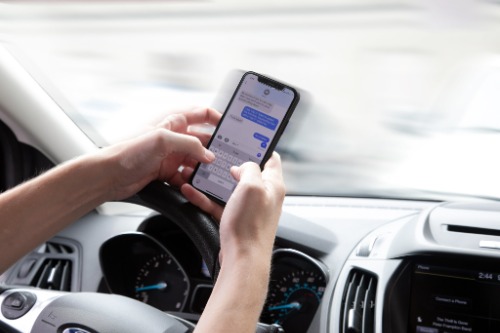1. “I’m good, how are you?”

This one’s practically automatic in American small talk. When someone asks how you’re doing, the expected response is “I’m good,” even if your day’s been awful or you barely slept. It’s less about truth and more about politeness — people don’t want to overshare or make casual interactions awkward. Researchers in communication often note that Americans value positivity and efficiency, so keeping things light is a kind of social lubricant.
The reason this qualifies as a polite lie is that it protects both parties from discomfort. It helps conversations stay brief and upbeat, especially in customer service or workplace interactions. Admitting you’re stressed or sad can sometimes feel like breaking an unspoken rule of friendliness. So, “I’m good” becomes a default setting — polite, predictable, and untrue just often enough to count.
2. “Let’s get together soon!”

This phrase sounds friendly but often has no real scheduling intent behind it. Americans use it to express goodwill without necessarily committing to an actual meet-up. It’s a way to close conversations on a positive note, especially when bumping into acquaintances or old coworkers. Linguists consider this a “phatic expression,” meaning it maintains social connection rather than literal meaning.
People say it because they genuinely like the idea of reconnecting — just not enough to rearrange their week for it. Life is busy, and vague promises feel easier than awkwardly admitting you probably won’t hang out. It’s a polite way to show warmth without obligation. Ironically, both sides usually understand it’s a social nicety, not a real plan.
3. “No worries!”

Americans love to downplay inconveniences, even when they’re a little annoyed. When someone apologizes — say, for being late or spilling coffee — “no worries” rolls off the tongue almost automatically. It’s meant to signal calm and forgiveness, not necessarily that the person feels no irritation. In many regions, it’s even taken from Australian English, where it also conveys casual friendliness.
This phrase smooths over small social friction. Saying “it’s okay” can sometimes sound too serious or imply that something really was wrong. “No worries” keeps things light and avoids tension. It’s a small white lie in the name of social grace.
4. “I’m almost there!”

In truth, the speaker is probably still at home, scrambling for their shoes. This phrase is a go-to when someone’s running late but doesn’t want to seem inconsiderate. It buys time and softens the guilt of tardiness. Americans value punctuality but also deeply fear disappointing others, which makes this a common fib.
People justify it by thinking “I’ll be there soon enough,” or “five minutes late isn’t that bad.” It’s not malicious — it’s more about easing the moment’s pressure. Everyone knows what “almost there” really means, but it still feels better to hear. It’s a socially accepted form of optimism in disguise.
5. “I love your outfit!”

Compliments like this are often genuine — but not always. Americans use flattery to build rapport, especially in workplaces or social gatherings. Even if the speaker doesn’t truly love the outfit, saying something nice creates instant warmth and positivity. It’s part of the country’s culture of friendliness and emotional affirmation.
This polite lie isn’t about deceit but about kindness. Complimenting someone can brighten their day or make an interaction smoother. It’s also an easy way to fill conversational gaps. In a culture that prizes encouragement, “I love your outfit” can mean “I see you, and I’m being nice.”
6. “It’s fine.”

Often, it’s not fine at all. When Americans say this, they might be frustrated or disappointed but don’t want to start conflict. It’s a social cue meaning “I don’t want to talk about it right now.” Studies in communication show that people often hide negative emotions to maintain harmony or avoid seeming confrontational.
This phrase helps people save face — both theirs and the listener’s. It signals closure, even when feelings are unresolved. In professional or romantic settings, “it’s fine” can be a form of emotional self-defense. The lie isn’t about pretending everything’s perfect; it’s about keeping peace in the moment.
7. “I’ll let you go.”

This one pops up when a conversation’s gone on a little too long. The speaker isn’t really “letting” the other person go — they’re politely excusing themselves. It’s a way to end a chat without sounding rude or disinterested. Social etiquette in American English favors gentle exits over bluntness.
It gives the impression of consideration, even though it’s often self-serving. People use it to maintain good vibes while reclaiming their time. It softens an ending that might otherwise feel abrupt. In short, it’s the verbal equivalent of a friendly wave goodbye before dashing off.
8. “I don’t mind.”

This phrase usually translates to “I do mind a little, but I’ll deal with it.” Americans use it to appear flexible or agreeable, especially in group decisions. It’s often easier to go along with a plan than to risk being labeled difficult. This small untruth helps maintain group cohesion and keeps interactions smooth.
“I don’t mind” also signals emotional maturity — at least on the surface. It says, “I’m chill,” even when someone’s secretly annoyed. It avoids open conflict in favor of quiet compromise. The irony is, if everyone’s lying like this, nobody’s ever really getting what they want.
9. “That’s interesting.”

This phrase is a social multitool — it can mean “fascinating,” “confusing,” or “please stop talking.” Americans rely on it when they don’t know how else to respond politely. It keeps the conversation moving without expressing disagreement or boredom. It’s one of those neutral phrases that can mask almost any reaction.
People use it to avoid confrontation or embarrassment. Saying “that’s weird” or “I don’t care” would be too blunt. “Interesting” leaves room for ambiguity, letting both parties save face. It’s a polite way to stay engaged — or at least appear to.
10. “I was just about to call you!”

This one’s a classic when someone beats you to the punch with a phone call or text. It’s rarely true, but it helps soften the surprise or guilt of not reaching out first. It gives the impression of effort — that you were thinking of them all along. Americans value relationships that seem mutual, so this fib helps restore balance.
It’s a small ego-saver for both people. Instead of admitting you’d forgotten, you spin a quick, harmless fiction. It maintains the illusion of equal enthusiasm. In social dynamics, that little white lie can keep friendships from feeling one-sided.
11. “Traffic was terrible.”

Sometimes traffic really is bad — but other times, it’s just an excuse. Americans use this to justify lateness because it sounds plausible and blame-free. It’s a socially acceptable scapegoat that shifts responsibility away from the person. In cities where commuting is part of daily life, it’s almost expected.
Even when the delay was due to oversleeping or poor planning, “traffic” feels safe to say. It doesn’t offend anyone or invite judgment. It’s a convenient way to preserve your reputation as a considerate person. Plus, since traffic could always be bad, no one can really call you out.
12. “I’m just tired.”

This phrase often covers up deeper feelings — stress, sadness, or burnout. Americans use it because “tired” is an acceptable emotion to admit. It’s easier to say than “I’m overwhelmed” or “I’m struggling.” Emotional privacy is a big part of U.S. culture, especially in professional or casual contexts.
By saying “I’m just tired,” people can express vulnerability without oversharing. It’s a shield that invites empathy but limits follow-up questions. The lie isn’t about fatigue — it’s about emotional protection. It lets people stay polite while quietly signaling that something’s off.
This post 12 Polite Lies Americans Tell Every Day Without Thinking was first published on American Charm.


